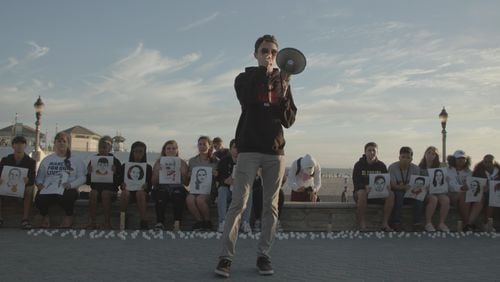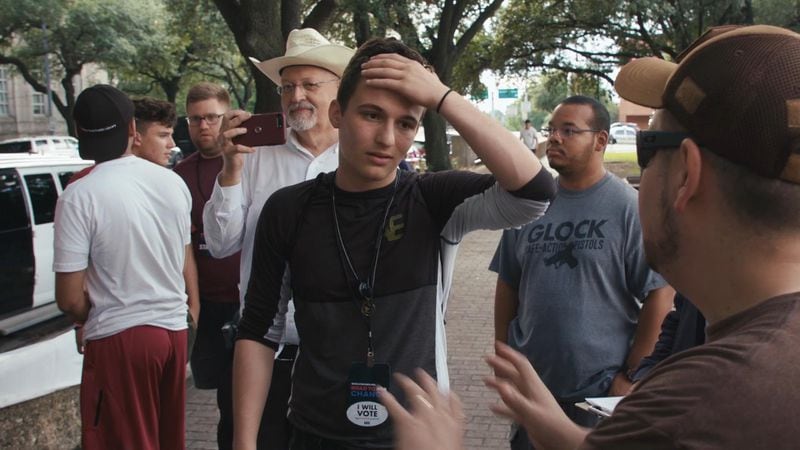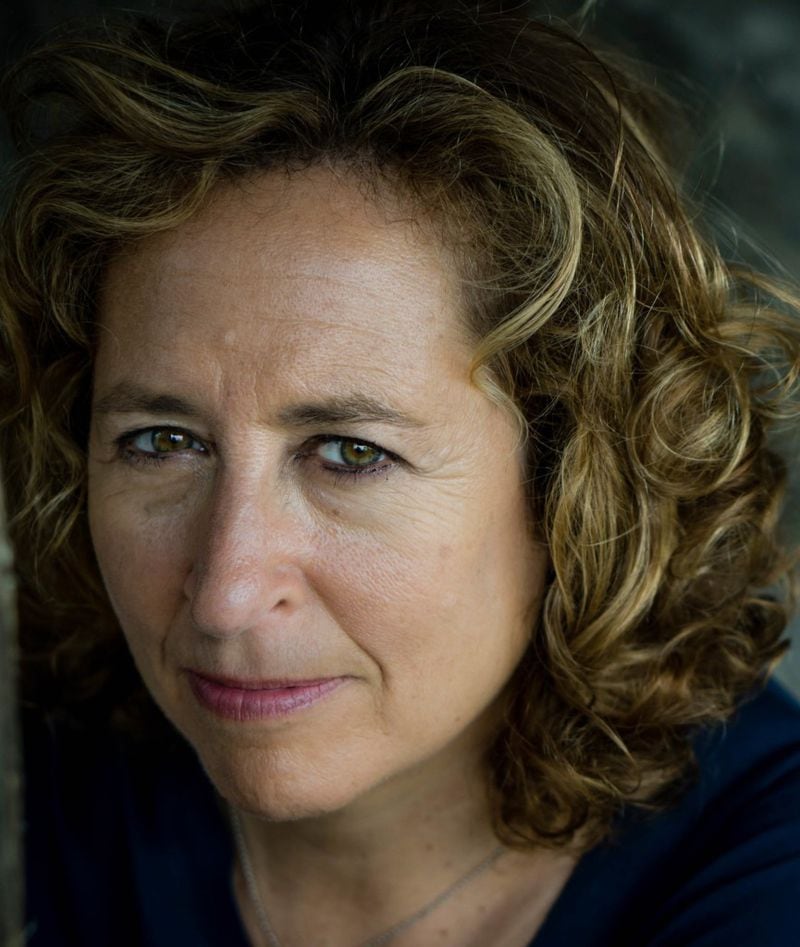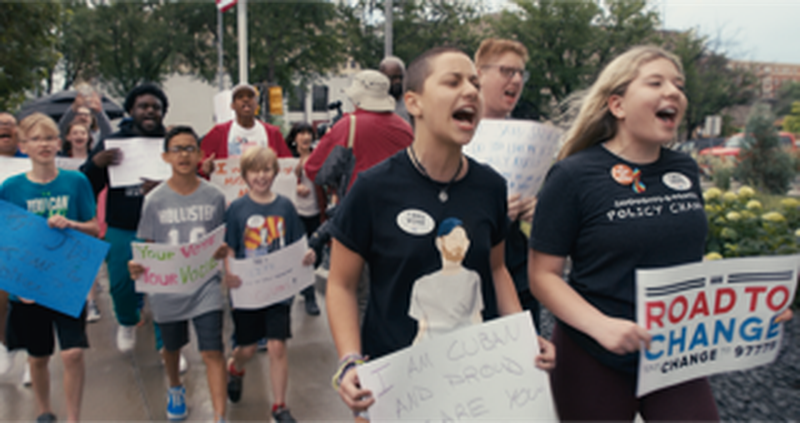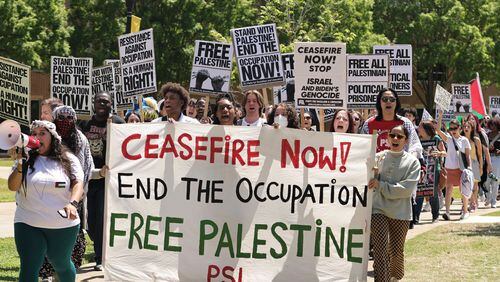The 2018 shooting at Marjory Stoneman Douglas High School in Parkland, Florida, resulted in the deaths of 17 people.
But the tragedy spawned a powerful movement as students, led by now-familiar names David Hogg and Emma Gonzalez, mobilized millions across the world to combat gun violence.
The documentary “Us Kids,” directed by Kim A. Snyder, follows the March for Our Lives revolution as it stormed the country in the summer of 2018. On display is not only the exhaustive work by these kids as they confront legislators and gun rights-activists, but the deep emotional scars, the cruel taunts from those opposed to their message and the general exhaustion that accompanies an unrelenting desire to effect change.
On Thursday, “Us Kids” will play at the Plaza Drive-In as part of a nine-city tour for the film, which premiered at Sundance earlier this year. Preceding the showing, MSD shooting survivors Samantha Fuentes and Alex Dworet (whose brother, Nicholas, was killed) will be on site for a conversation with attendees; as well, Snyder, also the director of the Peabody Award-winning “Newtown” and “Lessons from a School Shooting: Notes from Dunblane” (on Netflix), will beam in via Zoom.
The tour of drive-in screenings kicked off Aug. 25 in Miami and will also visit Raleigh, Philadelphia, Phoenix, and Detroit as part of the run.
While the documentary is focused on the students, Georgia Congresswoman Lucy McBath, whose 17-year-old son, Jordan Davis, was shot and killed in 2012 outside a Florida convenience store over a dispute about the volume of his car stereo, makes an appearance toward the end of the 99-minute film.
“You have been the game-changers. Your whole demographic, your whole age group, and I pray that you will go to the polls again and I’m praying that you will make guns a top priority,” McBath tells a group of students visiting Capitol Hill.
On Wednesday, Snyder called from Long Island to talk about “Us Kids” and why its fall release is so important.
Q: The film premiered in January at Sundance. Did it get delayed when the world turned upside down with the pandemic, or was the plan always to release it in the fall?
A: It’s not unusual to release and premiere at Sundance and have a general build though the festivals through fall. We were supposed to be at SXSW, the Miami Film Festival and dozens of others so we’ve been pivoting to understand the virtual festival world. It’s a lot of head scratching, but we have done a lot of virtual fests and got two awards from Full Frame (Documentary Film Festival, the Kathleen Bryan Edwards Award for Human Rights) and Mountainfilm (in Telluride, Colorado, best documentary feature). Simultaneously, the idea was always to partner with the kids and the movement in a critical time in the nation’s history and engage youth in civic engagement. When they told us we’re going to do this nine-city virtual tour, we thought why don’t we partner with March for Our Lives and have these screenings the day following.
Atlanta is special for us. When we were on the Road to Change (March for Our Lives’ summer 2018 bus tour), Atlanta and Roswell were so great and Roswell in particular was incredibly inspired and I remembered that. We don’t have hardly any adults in the movie, but we felt it was important to have Lucy’s face in there at the end. This is not red or blue. These kids don’t endorse candidates; they go to morally just leaders and policy, so the authenticity of Lucy having clearly walked the walk with gun violence, that has a whole different bearing. When they went to Roswell, they had an enormous influence in flipping the seat in the midterms in districts that were so important…I’m proud of them and try to reflect in the movie that pre-Black Lives Matter, from the get-go, they were completely attuned to not being tone deaf that they were coming from a predominantly white community (in Parkland).
Credit: Courtesy Us Kids Film
Credit: Courtesy Us Kids Film
Q: You had to jump into action pretty quickly to become part of their world. How did it all happen?
A: It was a crazy thing. My producing partner Maria (Cuomo Cole) and I had made “Newtown.” It was a gut punch to the country to say this is a moment that no one forgot. Sadly, I think we did become inured to it because of the hundreds of mass shootings that happened since that time. After (“Lessons from a School Shooting…”) I moved on and was exploring a different project in Florida and was in Tallahassee when everything unfolded in Parkland. I was on the steps of the capitol in Tallahassee when these busloads of kids pulled up (students from Parkland traveled to the state capitol to confront lawmakers about gun legislation). I had a camera and thought, I have to do this. I didn’t know (March for Our Lives co-founders) Jackie (Corin) then and she and Cameron (Kasky) were there with bullhorns and I captured it all. Emma did her “b.s. speech” and I felt, this moment is different... When Emma gave that speech it caught on to social media, the analogy that came to mind was Arab Spring and how it set off a firestorm of youth in that part of that world. I felt Emma’s speech was that and it went on to inspire Greta (Thunberg). It set off a world of kids who were ready to spring into action about so many things that were dire and threatened the safety of their lives. The film became a very different mission than Newtown to tell a story that is underlined by trauma and rage, but is transformed very quickly. What I hope the film depicts most is hope. It’s always young people who have that resilience and have the future.
Q: They’ve talked with the current administration, but has anyone from the group reached out to the Biden campaign?
A: We remain respectful with the movement. Emma was in the Democratic National Convention introducing Gabby Giffords. We stand with all advocates of preventing gun violence. We think it’s imperative that kids vote. We feel that they school themselves and become very well-versed with what’s happening with candidates and their positions on gun violence prevention. But they don’t endorse candidates so to speak. Our intention is to go out and turn out the youth vote and use the film as a tool. Hopefully what you also took away from the film is that this all really takes its toll. They’re kids. They deserve to have fun. You can’t be attacking them and neither can we fetishize them, like, “you’re the future, it’s all up to you.” We have to get up from our asses and help them.
Q: It was really interesting to see how quickly they learned how to navigate the media.
A: They figured it out in the beginning that they needed attention. At a certain point when Cameron said, the world is a video game and we have the codes, they had realized we have this special power and we don’t need your old-school media as much. We know what we’re doing and that’s how they got, in 37 days, a million people to show up in D.C. and many million more on five continents. They haven’t stopped. They’re not going to be stopped. They have disciples with over 300 chapters and are teaming with youth organizations in all the best ways to grow a real movement.
Q: Being as close to these kids as you were, how did you feel about seeing some of the insults and conspiracy theories and death threats and all of the other things they had to endure?
A: I felt utter empathy and respect. As I watched these kids I was thinking, what was I doing the summer of my junior or senior year? They did this in honor of their fallen friends and because they didn’t want it to happen to anyone else. I watched them roll across the country, not feeling healthy, eating fast food, sitting on a bus and they would school themselves. David would look up every gun legislation stat before we got to the next city. I’ve never seen any more industrious and self- sacrificing kids. I felt incredibly respectful and empathetic that they were still just kids, but also felt this burden…Some of them may have had to take a time out, but with this election being the most important of our lifetime, they’ve dug their heels in.
Q: So here we are more than two years later. What do you see?
A: I think they don’t see a choice. They don’t really feel they’ve been given a choice. Cameron says, I wish I could be one of those kids who didn’t care. But that’s any generation; there will be a segment of people who will be compelled that we have a better world and that certain dangers on the horizon are mitigated. They’re looking at an adult population of governance that is just so disappointing to them and they’re so angry and sick of it. They always have this image that for a while, they were like kids in a divorced family and the mom and dad were always fighting while they sat in the back seat watching and then they realized wait, they’re not driving the car - I have to take the wheel or I actually might die. That’s how I see them, as feeling we had to take the reins. The facts are too egregious. That we have the gun violence that we do compared to the rest of the world is unacceptable. The fact that our friends in black and brown communities are being affected by these rates is unacceptable. I do believe that there is a contingent of this generation that aspires for more compassion, more empathy. It’s less selfish and less greed driven. They’re restoring American values that are proud ones. Whether it’s the gun issues or COVID or Black Lives Matter, they get it. That social justice and equality is something written by our forefathers and that’s why I see them as patriots.
EVENT PREVIEW
“Us Kids”
8 p.m. Aug. 27. $40 per car. Plaza Drive-In, 1049 Ponce De Leon Ave. N.E., Atlanta. Screening will be preceded by an in-person conversation with Marjory Stoneman Douglas shooting survivors Samantha Fuentes and Alex Dworet, as well as a virtual appearance by director Kim A. Snyder. uskidsfilm.com/screenings/
About the Author
